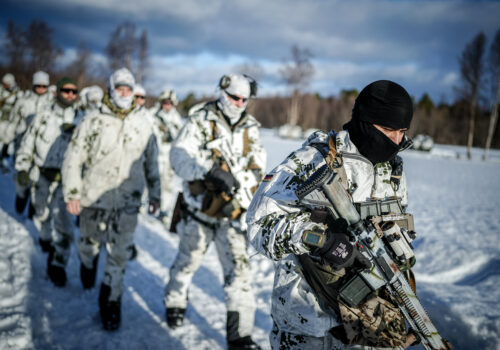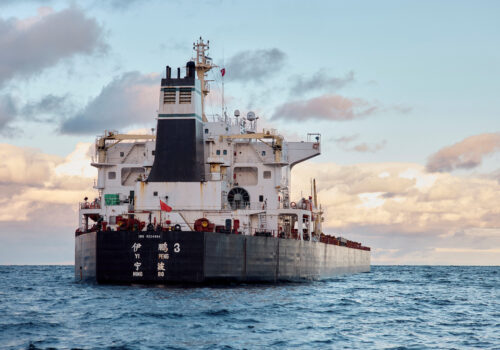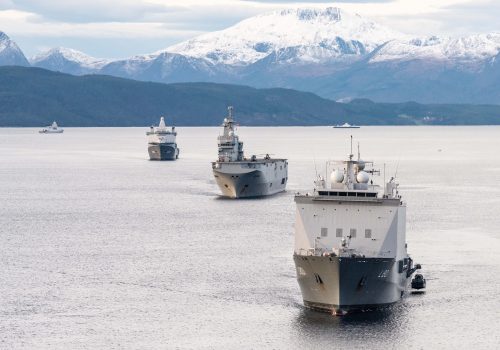How the Nordic-Baltic states are leading the way on European security
If you want to know what’s next for security in Europe, then watch the Nordic-Baltic nations. They may not have a reputation as the heaviest hitters in the transatlantic alliance, but the eight countries—Denmark, Estonia, Finland, Iceland, Latvia, Lithuania, Norway, and Sweden—are becoming increasingly significant players in European security. On November 28, Swedish Prime Minister Ulf Kristersson hosted his Nordic-Baltic colleagues together with Polish Prime Minister Donald Tusk at Harpsund, Sweden, where they pledged to step up military support to Ukraine and continue to invest in their own deterrence and resilience. Underscoring the increasing importance of the Nordic-Baltic states in European security, French President Emmanuel Macron even called in and joined the conversation.
For a region heavily affected by Russia’s full-scale invasion of Ukraine and dependent on the transatlantic alliance for its security, developments in the past month have been worrisome for the Nordic-Baltic states. Russia has been making territorial advances in Ukraine, stepping up hybrid warfare toward the West, and deepening its alliance with North Korea. Meanwhile, in the United States, an unpredictable President-elect Donald Trump will take office in January.
Trump’s claim that he would end the war in Ukraine “within twenty-four hours” of taking office led me and dozens of other experts, senior military officers, and politicians to warn in the Financial Times on November 5 against a new Munich 1938, where concessions to an aggressive Adolf Hitler led to World War II. A bad deal with Russian President Vladimir Putin would let Russia reconstitute its forces and likely lead to wider war, we wrote. Instead, we suggested a “coalition of the willing” made up of European states and Canada to take the lead on supporting Ukraine and not wait for the next US president to take office. The support of Nordic-Baltic states would be critical in any such coalition.
The Nordic-Baltic states have already demonstrated a commitment to bolstering their own and regional security. Seven of these countries already spend more than 2 percent of gross domestic product on defense and all are firm supporters of Ukraine and NATO. Furthermore, all eight of these states are specialists on “total defense,” which draws on the whole of society to prevail in the face of military attacks. In November, Sweden distributed a booklet to five million households explaining what to do “If the crisis or war comes.”
In the past month, the Nordic-Baltic states have taken on an unprecedented level of activity on regional security, stepping up on defensive measures and support to Ukraine. Last month, Sweden signed bilateral agreements on deepening defense cooperation with Lithuania and Poland. On November 21, Sweden joined sixteen other European Union member states in a letter of intent with the European Defence Agency to further develop integrated air and missile defense capabilities.
The Nordic-Baltic states also met in Copenhagen on November 22 at a Nordic Defence Cooperation meeting, where the Nordic countries signed a letter of intent for increased military mobility across borders. Ukrainian Defense Minister Rustem Umerov, who attended the meeting, could bring back to Kyiv promises of increased Danish and Norwegian defense industrial support. The day after, Sweden announced that it will finance Ukrainian long-range missiles and drones.
And there is more to come. Ideas flourished at the Harpsund summit, where Tusk proposed joint Nordic-Baltic-Polish patrolling in the Baltic Sea in light of increased hybrid warfare by Russia and China. Estonian Prime Minister Kristen Michal suggested that the same group of countries could pool resources to quickly repair damaged critical infrastructure in the Baltic Sea.
In Norway, in light of budgetary discussions in Parliament on support to Ukraine, a large group of experts have proposed in an open letter that the country should use its oil fund to drastically increase support to Ukraine.
These are just a few of the ideas percolating in Northern Europe. The challenge now is for leaders to turn more of these ideas into reality. While the Nordic-Baltic states are not the biggest nor the mightiest, if they can continue to work together, then they are set to make a real difference for European security at a pivotal moment for the transatlantic alliance.
Anna Wieslander is director for Northern Europe and head of the Atlantic Council Northern Europe Office in Stockholm.
Further reading
Wed, Aug 21, 2024
How a ‘Free North’ strategy can ensure Arctic and Baltic security
New Atlanticist By
The United States and its allies must work together to counter Russian and Chinese malign activity in the Arctic and Baltic regions.
Thu, Nov 21, 2024
Suspected sabotage by a Chinese vessel in the Baltic Sea speaks to a wider threat
New Atlanticist By Elisabeth Braw
Undersea cables and pipelines are acutely vulnerable to geopolitically motivated harm, as events of the last week have demonstrated.
Tue, Nov 5, 2024
How Sweden and Finland’s membership in NATO affects the High North
Issue Brief By Anna Wieslander
This issue brief explores the impact of Sweden and Finland’s NATO membership on the High North. Having Sweden and Finland in NATO strengthens the influence of the Alliance in the High North, as it responds to Russia's military buildup and China's regional interests. Deterring aggression while maintaining Arctic stability amidst rising geopolitical tensions will require new defense priorities and enhanced Nordic collaboration.
Image: Swedish prime minister Ulf Kristersson will receive heads of government from the Nordic and Baltic countries at a Summit at the Prime Minister's official summer home, Harpsund.


